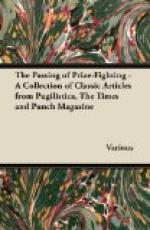But, holding that no rebel should shrink
from fratricide,
His gifted brother-Georgians he suddenly
defied,
And in a manifesto extremely clear and
terse
Announced his firm intention of giving
up free verse.
The range of his reaction may readily
be guessed
When I mention that for Browning his devotion
he confessed,
Enthroned above the SITWELLS the artless
Muse of “BAB,”
And said that MARINETTI was not as good
as CRABBE.
At first the manifesto was treated as
a joke,
A boyish ebullition that soon would end
in smoke;
But when he took to writing in strict
and fluent rhyme
His family decided to extirpate the crime.
Two scientific doctors declared he was
insane,
But likely under treatment his reason
to regain;
So he’s now in an asylum, where
he listens at his meals
To a gramophone recital of the choicest
bits from Wheels.
* * * * *
THE RETURN TO WOAD.
“The bride’s mother
was handsomely attired in heliotrope stain.”—
Canadian Paper.
* * * * *
OUR BOOKING-OFFICE.
(By Mr. Punch’s Staff of Learned Clerks.)
Whatever else may be said about Mr. ARTHUR COMPTON-RICKETT as a novelist, it can at least be urged for him that he displays no undue apprehension of the too-facile laugh. For example, the humorous possibilities (or perils) in the plot of The Shadow of Stephen Wade (JENKINS) might well have daunted a writer of more experience. Stephen Wade was an ancestor, dead some considerable time before the story opens, and—to quote the old jest—there was no complaint about a circumstance with which everybody was well satisfied. The real worry over Stephen was twofold: first, that in life he had been rightly suspected of being rather more than a bit of a rip, and secondly that his grandson, Philip, the hero of the story, had what seemed to him good cause for believing that Stephen’s more regrettable tendencies were being repeated in himself. Here, of course, is a theme capable of infinite varieties of development; the tragedies of heredity have kept novelists and dramatists busy since fiction began. The trouble is that, all unconsciously, Mr. COMPTON-RICKETT has given to his hero’s struggles a fatally humorous turn. Philip’s initial mistake appeared to be the supposition that safety could be secured by flight. But it has been remarked before now that Cupid is winged and doth range. Philip dashed into the depths of Devonshire, only to discover that even there farmers have pretty daughters; seeking refuge in the slums he found that the exchange was one from the frying-pan to the fire. In short, there was no peace for him, till the destined heroine.... Well, you can now see whether you are likely to be amused, edified, or bored by a well-meaning story, told (I should add) with a rather devastating solemnity of style.




